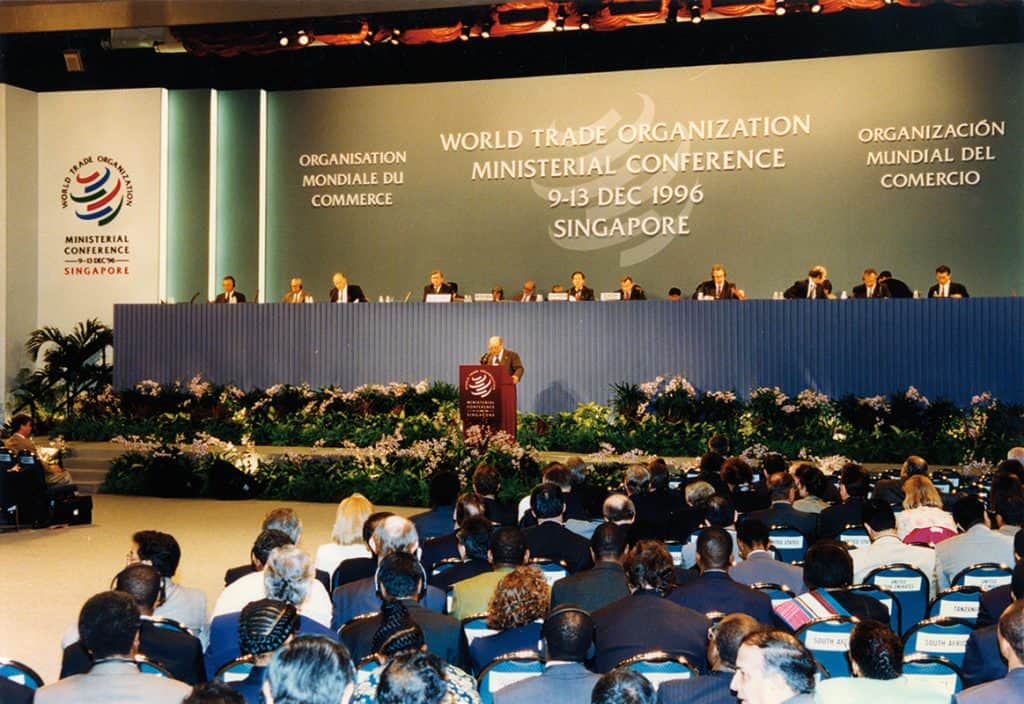
Bloomberg News carried an explosive account of a November 12th meeting of the World Trade Organization Committee on Budget, Finance & Administration at which the US raised “the possibility of blocking the approval of the institution’s biennial budget and effectively halting its work starting next year.” If a budget isn’t approved by consensus of the WTO’s 164 members – meaning a single country (e.g., the US) can veto it – then the institution won’t be able to function after December 31st.
US Trade Representative Lighthizer wouldn’t comment on the Bloomberg report. As Bloomberg notes, this “marks an escalation” in the US approach to the WTO. Previously the US merely blocked appointment of new Appellate Body judges.
The WTO conducts myriad activities that are economically useful worldwide and largely non-controversial beyond dispute settlement, such as clarifying agreed-upon sanitation rules for traded agricultural products, compiling statistical reports, and helping developing countries engage in global trade. Another key function is facilitating the settlement of disputes between members so that they don’t have to be taken to the formal dispute settlement system.
The issue here isn’t money. While the US contributes more than any other country to the WTO, it just amounts to $22.8 million this year, hardly enough to motivate any policy decision given the size of the US budget. It’s not even clear that the president can withhold funds from the WTO, since they are appropriated by Congress – as are all funds spent by the federal government. However, the president can decide to have his WTO ambassador block approval of the WTO budget thus shutting it down. He might then withhold the funds on the grounds that there is no recipient for them.
The auto tariff deadline that wasn’t
The deadline for President Trump to announce whether or not he would impose restrictions on automotive imports on national security grounds has come and gone — with no announcement. Most informed sources expect him to punt on a decision, perhaps deferring it for another six months while in the meanwhile releasing a report showing that foreign auto-makers plan to increase their investments in US factories.
While the president could defy expectations and quickly announce an array of automotive tariffs, if he does so he will be going against almost all advice from Congress and his advisors.
Foreign investment could ameliorate some of the “threat” found in the Commerce Department’s Section 232 report on automotive trade. The report claimed that the loss of US manufacturing in the sector due to imports risks a loss of US jobs and productive capacity potentially needed for military purposes. But Commerce went even further by suggesting that even domestic manufacturing by foreign brands poses a threat since it could lower the capital available to domestic brands for undertaking research and development. That’s a breathtaking claim given the fact that it is the US Fed and Treasury, not foreign manufacturers, that are unnecessarily sequestering hundreds of billions of dollars, preventing those funds from being productively invested in the US economy.
The Commerce report has not been released publicly even though the Section 232 legislation requires it to be, Senate Finance Committee Chairman Chuck Grassley (R-IA) has demanded it, and a US organization has filed an FOIA request for it. This suggests that its arguments for determining a national security threat are so weak that Commerce doesn’t dare publish the report.
The president would no doubt like to block automotive imports (especially German cars). But his hands are tied by the almost universal opposition to Section 232 tariffs from not just trading partners but the US auto industry, members of Congress of both parties, US businesses and farmers worried about foreign retaliation, and most of his own advisers.
His decision was also made more complicated by the fact that most of the countries from whom the US imports vehicles and parts – Japan, South Korea, Mexico, Canada – have recently concluded trade deals of various sorts that they insist exempt them from any new Section 232 automotive tariffs. The EU, another top automotive exporter, has made clear that it would break off trade talks with Washington and impose massive retaliation in response to such tariffs. China, the other significant exporter of auto parts to the US, could retaliate against US car companies that do a major portion of their business in China.
USMCA optimism
Despite the political tumult in Washington, President Trump appears on the way to a victory on Capitol Hill. A vote could come soon on the US-Mexico-Canada Agreement implementing bill. Efforts by the House Democratic leadership and US Trade Representative Robert Lighthizer to address Democratic concerns, especially over Mexico’s enforcement of its labor reforms, have been fruitful, and while there are other lingering concerns, it appears that a majority of Democrats may come out in support – enough for Speaker Nancy Pelosi to bring it to the House floor for a successful vote. But Thanksgiving and Christmas recesses have left very few legislative days to get the job done.

Leave a Reply